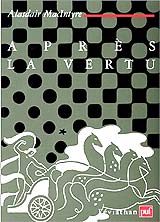
 Aristotelian arguments about morality involve a functional concept: the concept of man as having an essential nature and purpose or function. Functional concepts: the concept of a watch can’t exist without the concept of what makes a good watch (similar with farmer) so, on the basis of information about the watch’s characteristics (like timekeeping ability) we can say whether it is good or bad. Consider: He is a sea captain he ought to do whatever a sea captain ought to do. But, these philosophers reject the telos aspect. But, their moral schema requires 3 things: man in his untutored state, man-if-he-would-recognize-his-_telos_, and an ethics to tell us how to make that transition. All major Enlightenment philosophers rejected a teleological view of human nature, of man having an essence that defines his true end. It’s an achievement that reason lets us recognize beliefs are ultimately founded on nature, custom, and habit. Pascal anticipated Hume: anti-Aristotelian concept of reason restricts it to assessing facts, not determining ends even rejects Descartes’ belief it can refute skepticism. Chapter 5: Why the Enlightenment Project of Justifying Morality Had to Fail. Can give no reason for choosing one over the other any argument would have to be couched in terms of one system. Kierkegaard in Enten-Eller presents two ways of looking at the world: aesthetic and immersed in the present, or ethical and, well, responsible. Only in the late 17th to 18th century did the independent, rational justification of morality become central to Northern European culture.
Aristotelian arguments about morality involve a functional concept: the concept of man as having an essential nature and purpose or function. Functional concepts: the concept of a watch can’t exist without the concept of what makes a good watch (similar with farmer) so, on the basis of information about the watch’s characteristics (like timekeeping ability) we can say whether it is good or bad. Consider: He is a sea captain he ought to do whatever a sea captain ought to do. But, these philosophers reject the telos aspect. But, their moral schema requires 3 things: man in his untutored state, man-if-he-would-recognize-his-_telos_, and an ethics to tell us how to make that transition. All major Enlightenment philosophers rejected a teleological view of human nature, of man having an essence that defines his true end. It’s an achievement that reason lets us recognize beliefs are ultimately founded on nature, custom, and habit. Pascal anticipated Hume: anti-Aristotelian concept of reason restricts it to assessing facts, not determining ends even rejects Descartes’ belief it can refute skepticism. Chapter 5: Why the Enlightenment Project of Justifying Morality Had to Fail. Can give no reason for choosing one over the other any argument would have to be couched in terms of one system. Kierkegaard in Enten-Eller presents two ways of looking at the world: aesthetic and immersed in the present, or ethical and, well, responsible. Only in the late 17th to 18th century did the independent, rational justification of morality become central to Northern European culture. 
Only in the mid-16th into 17th century did “morality” become a separate thing from legal, religious, and aesthetic concerns.Chapter 4: The Predecessor Culture and the Enlightenment Project of Justifying Morality.

 That terminus of justification can, by definition, have no criteria for its choice (so say emotivists). All moral reasonings must at some point terminate-“why is that moral? Why that?”. Choice of premises appears arbitrary, yet we use language that appeals to objective standards. Having reached the premises, we have no way of deciding whose premises are better. All can be argued in coherent, logically valid ways, and you can only argue back to the premises. Moral arguments tend to talk past each other: consider pro-choice vs pro-life, libertarianism vs socialism, pacifism vs “ si vis pacem”-ism. Chapter 2: The Nature of Moral Disagreement Today and the Claims of Emotivism. (As much as possible, I’ve avoided editorialising in the notes.) This book is credited with reinvigorating the discussion of virtue ethics in the modern context-a branch of ethics that has been more or less ignored since Aquinas. These are my (extremely lengthy) notes on Alastair MacIntyre’s After Virtue.
That terminus of justification can, by definition, have no criteria for its choice (so say emotivists). All moral reasonings must at some point terminate-“why is that moral? Why that?”. Choice of premises appears arbitrary, yet we use language that appeals to objective standards. Having reached the premises, we have no way of deciding whose premises are better. All can be argued in coherent, logically valid ways, and you can only argue back to the premises. Moral arguments tend to talk past each other: consider pro-choice vs pro-life, libertarianism vs socialism, pacifism vs “ si vis pacem”-ism. Chapter 2: The Nature of Moral Disagreement Today and the Claims of Emotivism. (As much as possible, I’ve avoided editorialising in the notes.) This book is credited with reinvigorating the discussion of virtue ethics in the modern context-a branch of ethics that has been more or less ignored since Aquinas. These are my (extremely lengthy) notes on Alastair MacIntyre’s After Virtue.












